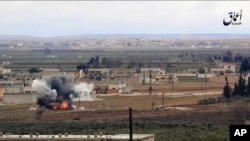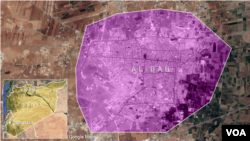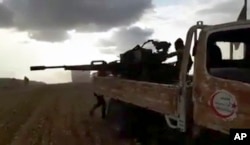Turkey's President Recep Tayyip Erdogan confirmed Sunday that Turkish troops and allied Syrian rebel militias have entered the center of the Syrian town of al-Bab, saying the ouster of Islamic State forces is just a “matter of time.”
“Al-Bab is now besieged from all fronts ... Our forces entered the center,” Erdogan told reporters in Istanbul. “Daesh forces have begun leaving al-Bab completely," he said, using the Arabic acronym for the terror group.
His comments came a day after Turkish forces first breached the northern and western limits of al-Bab, the last urban stronghold of Islamic State in Aleppo province.
But the big question analysts are now asking is what’s next for operation Euphrates Shield, the Turkish military intervention that started in August and has been aimed mainly at preventing U.S.-backed Kurdish forces from joining four Kurdish cantons across the north of Syria along the border with Turkey, undermining the Kurdish ambition of carving out an independent state.
Al-Bab has been a key target for both Operation Euphrates Shield, but also Syrian government forces. The Kurdish-dominated Syrian Democratic Forces at one time also coveted the town, which lies strategically to the north-east of the city of Aleppo, but backed off in December when Turkish warplanes targeted them aggressively, making it clear that Ankara would not tolerate the town falling into the hands of Kurdish forces advancing from the nearby town of Manbij.
“Neither the Syrian regime nor Turkey had any interest in the Kurds taking al-Bab,” argues Fabrice Balanche, an analyst with the Washington Institute for Near East Policy, a U.S.-based think tank. As Operations Euphrates Shield expanded, it became clear that the mission had at least tacit approval from Moscow and begrudging acceptance from Damascus, say analysts.
And Russian warplanes (and belatedly U.S.-led coalition jets) have targeted IS positions in al-Bab to assist the advancing Turkish forces. Turkish-backed troops have been careful not to come into contact with the forces of Syrian President Bashar al-Assad, who are now on the southern reaches of al-Bab, and in recent weeks the Turks made it clear they had no intention of heading further south of al-Bab or turning towards Aleppo city.
“The agreement between Russia and Turkey, in August 2016, joined by the Iranians, came at the expense of Kurdish interests,” says Balanche.
In return for the game-changing role of Turkey in northern Syria, Ankara has been aiding Syrian rebel militias that have been willing to fight alongside Turkish forces but have all but cut off aid for insurgent groups fighting Assad’s forces.
On Sunday, speaking to reporters, Erdogan said Turkish troops will not remain in Syria once "terrorist groups" — meaning Syrian Kurdish militias and IS — are defeated. Then Turkey, he said, will leave the land to their “true owners.” According to Erdogan the targets now for the Turks and their allies are Manbij, which is controlled by the Syrian Kurds, and Raqqa, the Islamic State’s de facto capital in Syria.
“After removing Daesh, the YPG [Syrian Kurdish People’s Protection Units] and the PYD [the Syrian-Kurdish Democratic Union Party] from the region and getting Daesh out of Raqqa, it will be too much of a luxury for us to say there. But it is currently too early to talk about such issues,” Erdogan said.
But it remains unclear whether the Assad regime, which has not been comfortable with the Turkish incursion into Syria, will want the Turks and their allies to drive on to Raqqa.
“The more real estate the Turks have in the north, the bigger their bargaining chip is in any final peace talks to resolve the war in Syria,” an Ankara-based European diplomat told VOA on the condition of anonymity. “This must make Assad nervous, but in the end he will have to toe Moscow’s line — that’s a reflection of how Assad is not fully in control of his destiny anymore and that how the war ends is more up to Moscow, Ankara and Tehran,” he added.
So far, there appears to be an acceptance of a demarcation line between the Turks and Assad’s forces. The line roughly corresponds with the Aleppo-Manbij road, running just south of al-Bab.
But some analysts say there remain high risks with having Turkish and Syrian regime forces in such close proximity. “What kind of contacts will be experienced?” queries Turkish political commentator Merve Şebnem Oruc.
Last week, a Russian jet struck a building in al-Bab where Turkish soldiers were staying. Three Turkish soldiers were killed and 11 injured. Ankara has accepted Moscow's explanation that the strike was an accident stemming from a coordination mistake. But more coordination problems could risk sparking a serious clash, especially if the Turks’ Syrian rebel proxies are struck by regime or Russian forces.
A further unknown after IS is ousted finally from al-Bab is how the U.S. will react, if Turkish forces turn their attention to Manbij and start pushing back the Kurdish-dominated SDF, America’s ground allies, east of the Euphrates River. The SDF has been earmarked by the U.S. as its main ally for a quick offensive against IS-controlled Raqqa. Will Washington dump the Kurds, as the Turks are demanding?
On the campaign trail, then candidate Donald Trump said he was a big fan of the Syrian Kurds. He said he hoped there was a way to get the Kurds and the Turks to join forces. ”I’m a big fan of the Kurdish forces. At the same time, I think we could have a potentially very successful relationship with Turkey. And it would be really wonderful if we could put them somehow both together," Trump said.
Few analysts believe that will happen. And a Turkish offensive through Manbij towards Raqqa would have the effect of turning the SDF’s attention away from the IS capital, delaying a major U.S.-backed assault on it. In recent days there has been a flurry of top Western military and intelligence officials visiting Ankara including last week CIA director Mike Pompeo, trying to square the circle.






